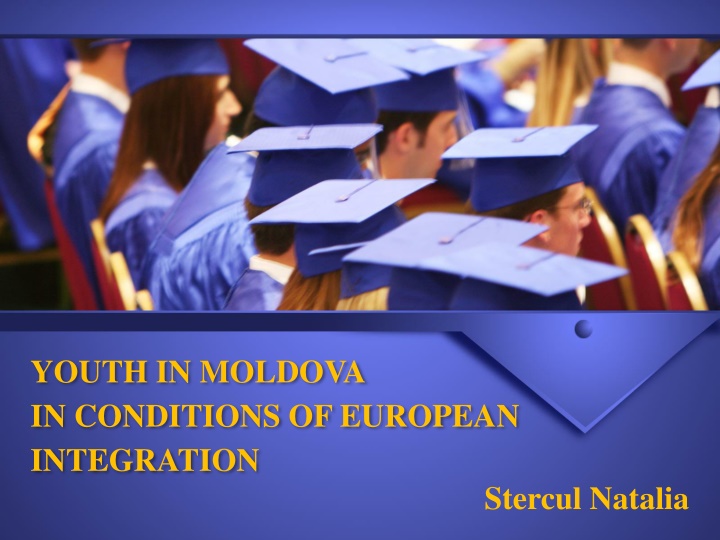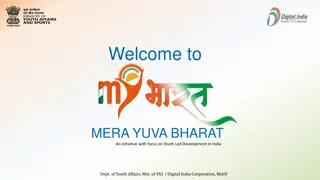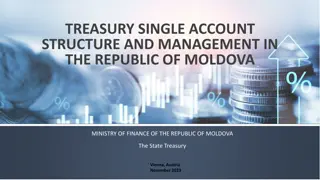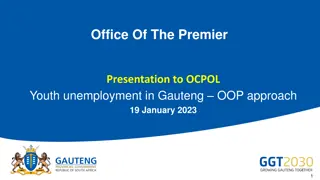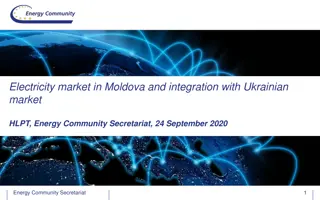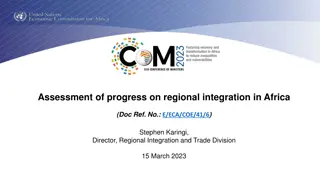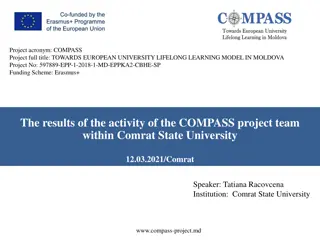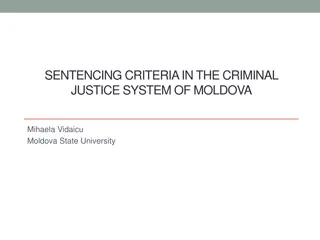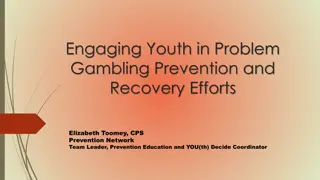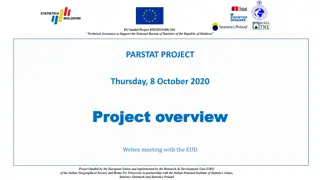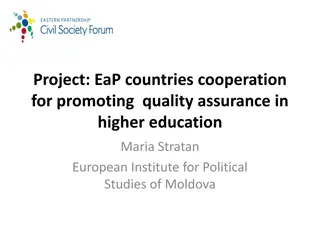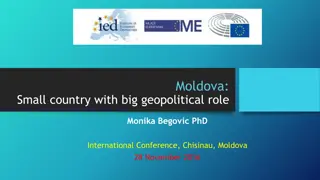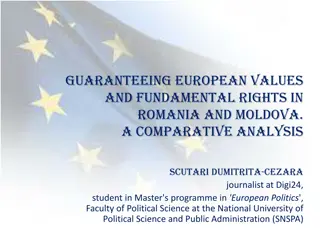Youth in Moldova: European Integration & Opportunities
Youth in Moldova, constituting 27% of the population, play a vital role in the country's European integration efforts. The Association Agreement and DCFTA pave the way for institutional reforms, economic advancements, and social development. Embracing EU norms, Moldova aims to strengthen relations with the European Union and resolve conflicts like the Transnistrian settlement process.
Download Presentation

Please find below an Image/Link to download the presentation.
The content on the website is provided AS IS for your information and personal use only. It may not be sold, licensed, or shared on other websites without obtaining consent from the author.If you encounter any issues during the download, it is possible that the publisher has removed the file from their server.
You are allowed to download the files provided on this website for personal or commercial use, subject to the condition that they are used lawfully. All files are the property of their respective owners.
The content on the website is provided AS IS for your information and personal use only. It may not be sold, licensed, or shared on other websites without obtaining consent from the author.
E N D
Presentation Transcript
YOUTH IN MOLDOVA IN CONDITIONS OF EUROPEAN INTEGRATION Stercul Natalia
EUROPEAN INTEGRATION The objective of the foreign and domestic policy of the Republic of Moldova. European integration is the strategic The framework of the European Neighbourhood Policy and its eastern regional dimension, the Eastern Partnership. The key goal is to bring Moldova closer to the EU. EU cooperates with Moldova in the
EUROPEAN INTEGRATION Moldova is invited to enter into intensified political, security, economic and cultural relations with the EU, enhanced cross border cooperation and shared prevention and conflict resolution. One of the key objectives Transnistria conflict. Once the Alliance for European Integration came into power, this gave a new blast to the main vector of the foreign policy of Moldova and the deepening of relations with the European Union, both bilaterally and multilaterally, through regional initiatives, particularly the Eastern Partnership. responsibility in conflict in this process is solution the
ASSOCIATION AGREEMENT AND DCFTA The Association Agreement is the most important element of the legal framework for the Republic of Moldova - EU dialogue. The signature and the subsequent entry into force of the Association Agreement, back in September 2014, have firstly imposed on the establishment of an institutional framework and necessary mechanisms for its implementation (Art.433-443). This objective was successfully achieved during 2015. The EU Moldova Association Agreement and DCFTA, was ratified by all EU member states and beginning 2016 well be fully implemented.
ASSOCIATION AGREEMENT AND DCFTA The Association Agreement represents a reform agenda for Moldova, based on a comprehensive programme of Moldova s approximation of its legislation to EU norms: Institutional reforms (mainly reforms of the judiciary sector); Economical and financial reforms; Reforms in education, social and pension fields Transnistrian settlement process (from 2016 to implement DCFTA within the Transnistria region).
YOUTH IN MOLDOVA Youth in the Republic of Moldova represent 27% of population. They make up the group of population that shows special interest in promoting youth policy at national and local level. According to the legislation of the Republic of Moldova, youth represents persons aging 16-30, but the official statistics of the Republic of Moldova define young population as persons aging 15-29. Part of this category are: high schools students, university students, high school and university graduates, employed youth, qualified and non-qualified youth looking for a job, young families, etc.
YOUTH IN MOLDOVA European integration is defined by Moldova as a fundamental development objective, which means the consistent implementation of common European values and standards, living standards and economic development models. In condition of European integration the Government of Republic of Moldova is fully engaged with European youth agenda and is implementing different programs and working plans to those similar already adopted by its European neighbors in the field of youth policy.
MIGRATION OF YOUNG PEOPLE Migration of young people represents a big problem for Republic of Moldova, that is continuously approached in public speeches, different strategic papers, policy notes etc. The main causes that determine the migration are: - lack of jobs 65,4% 64,9% - difficulty to earn money for a decent living 63,4% - poverty 22,4% - desire to live in a developed country 22,2% - corruption 11,5% - economic and political instability
EDUCATION Education is a foundation for economic growth and social development. Poverty reduction efforts cannot succeed without equitable investments in human capital: knowledge, competencies and creative capacities. Education in Moldova has registered in last years several improvements as modern curricula, quality standards of education, raise of interest of young people for life long learning and literacy among youth is continuously increasing.
Bologna Process Bologna Process in the education system of the Republic of Moldova: Improvement of the legal framework for the organization of higher education; Creation of a higher education system structured on cycles; The implementation of European Credit Transfer System (ECTS); Ensuring the quality of higher education; Activities for drafting the National Framework of Qualifications. Bologna Declaration (2010) of uniform European educational space; creation in Europe the most competitive and dynamical economy in the world; realization institutional reforms and perfection of system of compatibility of national educational standards.
BOLOGNA PROCESS IN THE EDUCATION SYSTEM OF THE REPUBLIC OF MOLDOVA Collaboration of the UN Agencies, World Bank, Council of Europe and European Commission, East European Foundation, International Organization for Migration and other international structures are very significant factor for governmental structures working with youth. The activity of national body responsible for youth, donors and youth organizations favour the development of youth policy and motivate young people to participate in this process. The international organizations give a substantial financial support for many youth projects.
BOLOGNA PROCESS IN THE EDUCATION SYSTEM OF THE REPUBLIC OF MOLDOVA Collaboration of the UN Agencies, World Bank, Council of Europe and European Commission and other international structures are very significant factor for governmental structures working with youth. The activity of national body responsible for youth, donors and youth organizations favour the development of youth policy and motivate young people to participate in this process.
BOLOGNA PROCESS IN THE EDUCATION SYSTEM OF THE REPUBLIC OF MOLDOVA As the first Eastern Partner, Moldova has become associated with the Horizon 2020 programme through which the EU supports research and innovation. It also participates in the Erasmus+ programme for education, training, youth and sport. In March 2015, Moldova joined the European programme for culture Creative Europe. It has done so both as part of the Eastern Partnership Culture programme and as part of of the Eastern Partnership "Contacts between people" platform.
Priorities of the National Youth Strategy 2014-2020 Priorities Projects and initiatives Youth participation: - involving young people in the - decision making process, - CivicActivism, - Local Youth Councils, - Youth Mobility, Youth Information Creating an online national Platform for youth participation; - Establishment of District Youth Councils in all districts; -Accreditation of volunteering organizations. - Services for youth: - Youth Resource Centres, -Youth Friendly Health Centers, - outreach services, - Interships, healthy lifestyle promotion - Development of minimum quality standards for services for youth and accreditation of youth service providers; - Development of the Youth Friendly Service Providers Strategy.
Priorities of the National Youth Strategy 2014-2020 Priorities Projects and initiatives Economic opportunities for youth: - youth economic empowerment, - employment opportunities - Developing the components of the National Programme for Economic Empowerment of Youth; -Accreditation of training services provided by youth organizations. Services for youth will be focused on: - Strengthen Youth civil society, - youth labour and workers, - intersectoral cooperation, development of the legal framework in the field, - non formal education. - Development of minimum quality standards for services for youth and accreditation of youth service providers; - - Development of the Youth Friendly Service Providers Strategy.
EUROPEAN INTEGRATION AND EU PRINCIPLES The biggest part of the Moldovan population support the EU principles: Rule of low and strong democratic institutions; Human rights and non-discrimination; Elimination of corruption; Market economy and loyal competition
CURRENT POLITICAL MOLDOVA SITUATION IN Political divided into two antagonistic groups (pro-Western and pro-East); establishment - Moldovan Electorate High level of political and economic corruption. This discredited the European vector and reduced its popularity; Low results of reform process; Long-term Transnistrian dialog;
CURRENT POLITICAL MOLDOVA SITUATION IN Political and economic crises; Moldovans, aged 18 to 25 years ignored the presidential elections. From the total number of voters they represent only 10.07 percent; According to the Barometer of Public Opinion 2016 (85,9%) population consider that the country moving towards wrong direction. Young generation supports representatives of pro-European vector.
CRISIS IN THE EU - The increasing Euroscepticism in European countries Since the beginning of the euro crisis, trust in the European Union has fallen from +10 to -22 % in France, from +20 to -29 % in Germany, from +30 to -22 % in Italy, from +42 to -52 % in Spain, from +50 to +6 % in Poland, from -13 to -49 % in the United Kingdom. Since the crisis began, citizens in creditor countries have become resistant to taking responsibility for the debts of others without having mechanisms for controlling their spending. - Brexit - migration problems - difficulties in the relationships between EU and Turkey.
RECOMMENDATIONS - to strengthen cooperation with EU and perform the obligations; - to streamline the youth work at regional level, mainly by consolidation networks of youth NGOs, youth councils, youth centers, youth information services and to encourage local communities to support local youth councils by developing systems of communication; - to focus on creation opportunities for development of youth business.
RECOMMENDATIONS This should implement by: - consolidating the social partnership with civil society, especially youth associations; - encouraging cooperation on youth problems; dialogue and the inter-ministerial - consolidating European and international cooperation in youth problems and related areas; - creating an legal framework on the basis of European practices.
